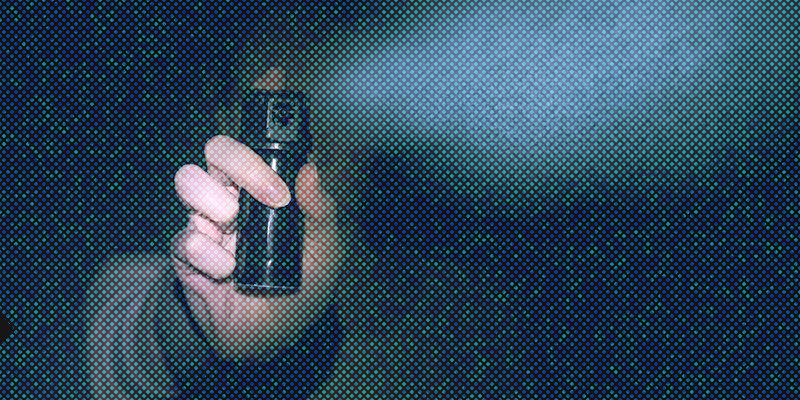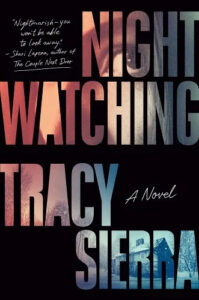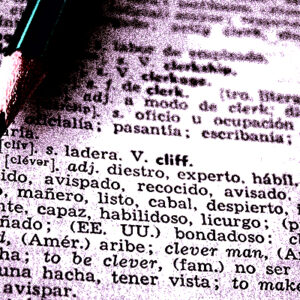I once heard a joke that went something like: A man tells God, “I think my role should be to protect my family.” God says, “Great! Since infection is one of the most common risks to children, that means you’ll sanitize your kids’ bottles, change their diapers, find a pediatrician, schedule and take them to doctor’s appointments, be sure to wash—” and the man interrupts, “No, no, no, I didn’t mean protect like that.”
My debut thriller, Nightwatching, begins with a scenario in line with what the man in the joke was clearly imagining: a bump in the night. An intruder in the house. A parent forced to protect and defend.
But the unnamed heroine’s husband is absent, leaving her home alone with her young children. Purely by chance she’s awake in the middle of the night tucking her son back into bed when she sees the intruder, whose location separates her from her car, from where her phone sits on a bedside table and a gun is secured in her bedroom. A blizzard prevents any opportunity to successfully flee from her isolated house with barefoot children in tow. In marked contrast to the stranger’s strength and size, the mother is slight. She has no special physical skills or training.
This conceit of an everywoman plunged into an action movie scenario, forced to protect her home and children, allows Nightwatching to explore questions of how we define strength, who among us receives the benefit of the doubt, what characteristics we elevate, and why our responses to these issues are so often inextricably tangled with gender. The joke elicits a sardonic laugh or an eyeroll because we’re all aware that the tasks ‘God’ lists—mundane logistical planning and chores—are utterly necessary to protect children. But we also know that as so often happens when a task is dull, daily, unpaid, and especially when it deals with childrearing, this particular type of protection is traditionally classified as feminine. We understand the man is instead picturing his role as action hero—Bruce Willis crawling through a vent in Die Hard to rescue his wife, Liam Neeson tracking down his daughter in Taken, or even the female corollary, the “mama bear” of urban legend who surges with so much adrenalin she’s able to lift a wrecked car off her pinned child.
Just like the man in the joke, frequently our default reaction when we hear the word “protect” is to picture a daring last-minute rescue or a violent act. “A man’s home is his castle” isn’t just a pithy phrase, but has been codified into law everywhere from 17th century England into the present day United States, where many jurisdictions’ castle doctrine permits deadly force against an intruder. Because men (of course, not all men, not always, and not by all definitions) are often physically stronger than the others they share a life with, it seems logical that in the event that some kind of physical confrontation becomes necessary to protect, they would take it on.
So in part, this myopic understanding of “protection” makes sense. Of course the man isn’t interested in the endlessly repetitive and dull protective chores. Who is? It’s far easier to sit back and imagine yourself as a heroic barrier against theoretical danger than to do even one of the very real and unpleasant tasks ‘God’ sets out in the joke—changing a diaper five times a day for two to three years, for example. On top of which, from sports to movies, society elevates the importance of physical strength and skill to the point that it can appear to be on par with, or even superior to, moral virtue, sacrifice, or intellectual merit. Stories of physical defense and rescue are memorably interesting and even entertaining, especially because the vast majority of the time in a civil society, they remain on screen or in imagination. In contrast, getting a toddler safely clipped into a well-researched and properly-installed car seat and then driving at the speed limit? Not exactly compelling or a situation where you try to picture how you’d perform — though absurdly more likely to happen in real life, and more likely to protect a child than any physical altercation.
Superior fighting strength is not an asset on the heroine’s table in Nightwatching. With a gun locked in a safe and kept separate from ammunition (as it always must and should be in a home with children), there’s no weapon to give her an advantage.
Yet the mother has other, less celebrated, strengths. Her smaller size, her children’s small size, may be a liability in a physical fight, but help them hide from the intruder. The mother, simply by being the primary parent in her household, understands who her children are and how to help them cope with their awful situation. Her familiarity with every inch of her house—written into her bones after overnight trips in the dark to nurse, give a bottle, change wet sheets, tuck a child back in after a nightmare, the endlessly recurring, exhausting type of daily “protective” tasks that so often fall to mothers — allows her to track the intruder’s movements. As a mother, as a woman, she has also had to accept and experience pain and physical sacrifice as an expected, almost routine, part of adult life. She identifies the intruder and understands the gravity of the threat he poses because of a nearly universal skill among those who present as women, one born out of awareness of physical vulnerability: before her ordeal she recognized subtle signs of potential danger in a stranger; ideas her husband dismissed as emotional and paranoid. Well aware she is physically outmatched, all these characteristics, along with intelligence, patience, emotional maturity, and an ability to plan ahead, must come into play if she wants to see herself and her children safely through the night.
But Nightwatching’s heroine, unlike the one person army or invincible hero of traditional action fare, also experiences immense fear of the unknown, of pain, and struggles with her own physical and emotional reaction to those fears. She is plagued by insecurities and uncertainty, forcing readers to cope with the ways these issues may impact her reliability. Does the mother understand what’s happening, and what she’s doing? Does acknowledging her weaknesses make her weak? Has her past trauma permanently impacted her stability? Is she filled with self-doubt because she knows she’s done something wrong? If she’s not at some kind of fault, why does she blame herself for her situation, revisiting all she could have done better or differently? Is she a “good” mother at all? Or has she failed her children already, and irrevocably?
After all, she’s unnamed not just because she could be anyone, but because like anyone outside the confines of our own consciousness, she remains a stranger to us. And maybe, just maybe, we judge female strangers, particularly mothers, with a uniquely critical eye.
Maybe more than that, each woman judges herself most mercilessly of all.
***


















